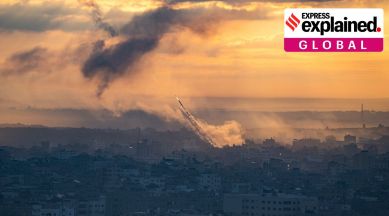Hamas-Israel escalation: What we know so far, and whether it could lead to the Third Intifada
Hamas has launched thousands of rockets and sent in its fighters into southern Israel, heating up a conflict that has plagued the region for seven decades.

Palestinian fighters in the Gaza Strip crossed over and infiltrated into southern Israel on Saturday (October 7), and fired thousands of rockets into the country, as the ruling Hamas announced the beginning of a new operation.
“Enough is enough,” Mohammed Deif, the elusive leader of Hamas’ military wing, said in a recorded message as he called on Palestinians to join “Operation Al-Aqsa Storm”, Hamas’ biggest military offensive in years. Salah Arouri, an exiled Hamas leader, told The AP the operation was a response “to the crimes of the occupation.”
Israeli Defence Minister Yoav Gallant told the media that Hamas has started a war that “Israel will win.”
What has happened so far
Earlier on Saturday, Hamas fired as many as 5,000 rockets into Israel. Warning sirens wailed in cities and towns across Israel as people sought refuge in bomb shelters. It is yet unclear how many casualties these rockets led to. Israel too has launched strikes in Gaza where witnesses have reported hearing massive explosions, Reuters reported.
Alongside the rockets, Palestinian fighters crossed over into Israel, breaking through the heavy fencing at multiple locations. Since the morning, videos on social media have shown Hamas fighters in Israeli towns along the Gaza border, shooting at Israeli military personnel and civilians alike. The AP, however, has failed to verify the authenticity of the videos.
Israeli media has reported gun battles between bands of Palestinian fighters and Israeli forces in towns in southern Israel. Israel’s police chief said there are “21 active scenes” in southern Israel, reported Reuters. There have also been reports of some Israeli personnel being taken captive by Hamas.
Due to the sudden escalation, people living on either side of the border of the besieged Gaza strip are beginning to flee their homes and move to safer locations. Israel has asked its residence to remain indoors. There has also been international concern, with the UK and France condemning Hamas’ attack while Egypt’s foreign ministry called for “exercising maximum restraint and avoiding exposing civilians to further danger”.
A historical conflict
This is the latest chapter in a long history of conflict in the region. Zionism — an ethno-nationalist movement which sought to establish a homeland for the Jewish people in Palestine — emerged in the late 19th century. The support for a Jewish nation grew significantly in the aftermath of World War II, as the horrors of the Nazi Holocaust of Jewish people came to be fully known.
Thus, in 1948, with the support of the United Nations and the British, who had taken over control of the region after the Ottomans, Israel was born. As per the Partition Plan adopted by the UN in 1947, the British territory of Palestine would be divided into a Jewish and an Arab state. But almost immediately, war broke out between Zionist settlers, who had been thronging to Palestine, and Arabs.
The first Arab-Israeli War ended in 1949 with Israel’s victory — in no small part due to support from the West — and the displacement of 750,000 Palestinians. The territory was divided into 3 parts: the Jewish Israel, and the Arab West Bank and Gaza Strip. However, this failed to resolve the conflict which continues till date.
In the 75 years, Israel has fought multiple wars against its Arab allies as well as dealt with uprisings in Palestinian territories. Israel, meanwhile, has rapidly modernised and strengthened itself, with the support of the West, and expanded its occupation of Palestine beyond the boundaries set forth in the 1947 UN plan.
A third Intifada?
Some observers have referred to the latest escalation as the beginning of the “Third Intifada”.
Intifada is an Arabic word that means to ‘shake off’. It came into popular usage in December 1987, with Palestinians using it to describe their uprising against the Israeli presence in the West Bank and Gaza. Palestinian-American scholar Edward Said, in a 1989 essay titled ‘Intifada and Independence’, described the intifada as the response of a people pushed to the wall by the “bare-knuckled” Israeli attempt to rob them of their history, land and nationhood.
The First Intifada lasted from 1987 to 1993, and the Second Intifada from 20o0-2005. These were extremely popular uprisings spearheaded by Palestinian youth sick of the treatment they faced from the much more powerful Israeli settlers in their own homeland.
Since the end of the Second Intifada, tensions between Israel and Palestine have not quieted down. Israel has continued to expand its presence in Palestinian territories while Palestinian organisations such as the PLF and Hamas, have stepped up terror attacks and bombings.
Many have been wary of a ‘Third Intifada’ for years, especially amidst the rise of the ultranationalist far-right in Israel with its extreme position on Palestine. As per the think tank Council on Foreign Relations, “2022 marked the most conflict-related deaths for both Israelis and Palestinians since 2015, and violence has continued to escalate in 2023, with the West Bank on track for its deadliest year since 2005 amid almost daily Israeli incursions.” Israel has also carried out multiple raids of the holy Al-Aqsa Mosque in Jerusalem this year, further heightening tensions and eventually leading to Hamas’s latest operation, named after the mosque, earlier today.